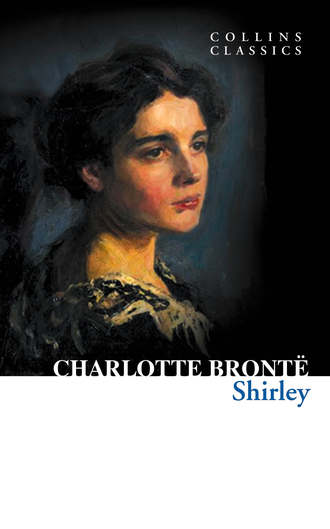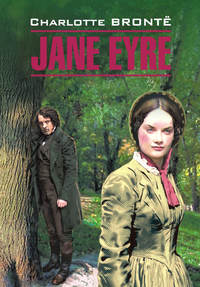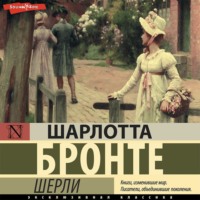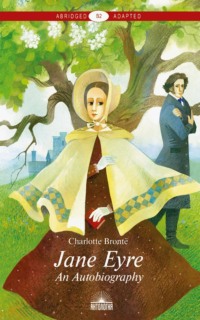
Полная версия
Shirley
“He has not his peer,” she thought. “He is as handsome as he is intelligent. What a keen eye he has! What clearly-cut, spirited features—thin and serious, but graceful! I do like his face, I do like his aspect, I do like him so much—better than any of those shuffling curates, for instance—better than anybody; bonny Robert!”
She sought “bonny Robert’s” presence speedily. For his part, when she challenged his sight, I believe he would have passed from before her eyes like a phantom, if he could; but being a tall fact, and no fiction, he was obliged to stand the greeting. He made it brief. It was cousin-like, brother-like, friend-like, anything but lover-like. The nameless charm of last night had left his manner: he was no longer the same man: or, at any rate, the same heart did not beat in his breast. Rude disappointment, sharp cross! At first the eager girl would not believe in the change, though she saw and felt it. It was difficult to withdraw her hand from his, till he had bestowed at least something like a kind pressure; it was difficult to turn her eyes from his eyes, till his looks had expressed something more and fonder than that cool welcome.
A lover masculine so disappointed can speak and urge explanation, a lover feminine can say nothing; if she did, the result would be shame and anguish, inward remorse for self-treachery. Nature would brand such demonstration as a rebellion against her instincts, and would vindictively repay it afterwards by the thunderbolt of self-contempt smiting suddenly in secret. Take the matter as you find it: ask no questions, utter no remonstrances; it is your best wisdom. You expected bread, and you have got a stone: break your teeth on it, and don’t shriek because the nerves are martyrized; do not doubt that your mental stomach—if you have such a thing—is strong as an ostrich’s; the stone will digest. You held out your hand for an egg, and fate put into it a scorpion. Show no consternation: close your fingers firmly upon the gift; let it sting through your palm. Never mind; in time, after your hand and arm have swelled and quivered long with torture, the squeezed scorpion will die, and you will have learned the great lesson how to endure without a sob. For the whole remnant of your life, if you survive the test—some, it is said, die under it—you will be stronger, wiser, less sensitive. This you are not aware of, perhaps, at the time, and so cannot borrow courage of that hope. Nature, however, as has been intimated, is an excellent friend in such cases, sealing the lips, interdicting utterance, commanding a placid dissimulation—a dissimulation often wearing an easy and gay mien at first, settling down to sorrow and paleness in time, then passing away, and leaving a convenient stoicism, not the less fortifying because it is half-bitter.
Half-bitter! Is that wrong? No; it should be bitter: bitterness is strength—it is a tonic. Sweet, mild force following acute suffering you find nowhere; to talk of it is delusion. There may be apathetic exhaustion after the rack. If energy remains, it will be rather a dangerous energy—deadly when confronted with injustice.
Who has read the ballad of “Puir Mary Lee”—that old Scotch ballad, written I know not in what generation nor by what hand? Mary had been ill-used—probably in being made to believe that truth which was falsehood. She is not complaining, but she is sitting alone in the snowstorm, and you hear her thoughts. They are not the thoughts of a model heroine under her circumstances, but they are those of a deeply-feeling, strongly-resentful peasant-girl. Anguish has driven her from the ingle-nook of home to the white-shrouded and icy hills. Crouched under the “cauld drift,” she recalls every image of horror—“the yellow-wymed ask,” “the hairy adder,” “the auld moon-bowing tyke,” “the ghaist at e’en,”, “the sour bullister,” “the milk on the taed’s back.” She hates these, but “waur she hates Robin-a-Ree.”
“Oh, ance I lived happily by yon bonny burn—
The warld was in love wi’ me;
But now I maun sit ’neath the cauld drift and mourn,
And curse black Robin-a-Ree!
“Then whudder awa, thou bitter biting blast,
And sough through the scrunty tree,
And smoor me up in the snaw fu’ fast,
And n’er let the sun me see!
“Oh, never melt awa, thou wreath o’ snaw,
That’s sae kind in graving me;
But hide me frae the scorn and guffaw
O’ villains like Robin-a-Ree!”
But what has been said in the last page or two is not germane to Caroline Helstone’s feelings, or to the state of things between her and Robert Moore. Robert had done her no wrong; he had told her no lie; it was she that was to blame, if any one was. What bitterness her mind distilled should and would be poured on her own head. She had loved without being asked to love—a natural, sometimes an inevitable chance, but big with misery.
Robert, indeed, had sometimes seemed to be fond of her; but why? Because she had made herself so pleasing to him, he could not, in spite of all his efforts, help testifying a state of feeling his judgment did not approve nor his will sanction. He was about to withdraw decidedly from intimate communication with her, because he did not choose to have his affections inextricably entangled, nor to be drawn, despite his reason, into a marriage he believed imprudent. Now, what was she to do? To give way to her feelings, or to vanquish them? To pursue him, or to turn upon herself? If she is weak, she will try the first expedient—will lose his esteem and win his aversion; if she has sense, she will be her own governor, and resolve to subdue and bring under guidance the disturbed realm of her emotions. She will determine to look on life steadily, as it is; to begin to learn its severe truths seriously, and to study its knotty problems closely, conscientiously.
It appeared she had a little sense, for she quitted Robert quietly, without complaint or question, without the alteration of a muscle or the shedding of a tear, betook herself to her studies under Hortense as usual, and at dinner-time went home without lingering.
When she had dined, and found herself in the rectory drawing-room alone, having left her uncle over his temperate glass of port wine, the difficulty that occurred to and embarrassed her was, “How am I to get through this day?”
Last night she had hoped it would be spent as yesterday was, that the evening would be again passed with happiness and Robert. She had learned her mistake this morning; and yet she could not settle down, convinced that no chance would occur to recall her to Hollow’s Cottage, or to bring Moore again into her society.
He had walked up after tea more than once to pass an hour with her uncle. The door-bell had rung, his voice had been heard in the passage just at twilight, when she little expected such a pleasure; and this had happened twice after he had treated her with peculiar reserve; and though he rarely talked to her in her uncle’s presence, he had looked at her relentingly as he sat opposite her work-table during his stay. The few words he had spoken to her were comforting; his manner on bidding her good-night was genial. Now, he might come this evening, said False Hope. She almost knew it was False Hope which breathed the whisper, and yet she listened.
She tried to read—her thoughts wandered; she tried to sew—every stitch she put in was an ennui, the occupation was insufferably tedious; she opened her desk and attempted to write a French composition—she wrote nothing but mistakes.
Suddenly the door-bell sharply rang; her heart leaped; she sprang to the drawing-room door, opened it softly, peeped through the aperture. Fanny was admitting a visitor—a gentleman—a tall man—just the height of Robert. For one second she thought it was Robert—for one second she exulted; but the voice asking for Mr. Helstone undeceived her. That voice was an Irish voice, consequently not Moore’s, but the curate’s—Malone’s. He was ushered into the dining-room, where, doubtless, he speedily helped his rector to empty the decanters.
It was a fact to be noted, that at whatever house in Briarfield, Whinbury, or Nunnely one curate dropped in to a meal—dinner or tea, as, the case might be—another presently followed, often two more. Not that they gave each other the rendezvous, but they were usually all on the run at the same time; and when Donne, for instance, sought Malone at his lodgings and found him not, he inquired whither he had posted, and having learned of the landlady his destination, hastened with all speed after him. The same causes operated in the same way with Sweeting. Thus it chanced on that afternoon that Caroline’s ears were three times tortured with the ringing of the bell and the advent of undesired guests; for Donne followed Malone, and Sweeting followed Donne; and more wine was ordered up from the cellar into the dining-room (for though old Helstone chid the inferior priesthood when he found them “carousing,” as he called it, in their own tents, yet at his hierarchical table he ever liked to treat them to a glass of his best), and through the closed doors Caroline heard their boyish laughter, and the vacant cackle of their voices. Her fear was lest they should stay to tea, for she had no pleasure in making tea for that particular trio. What distinctions people draw! These three were men—young men—educated men, like Moore; yet, for her, how great the difference! Their society was a bore—his a delight.
Not only was she destined to be favoured with their clerical company, but Fortune was at this moment bringing her four other guests—lady guests, all packed in a pony-phaeton now rolling somewhat heavily along the road from Whinbury: an elderly lady and three of her buxom daughters were coming to see her “in a friendly way,” as the custom of that neighbourhood was. Yes, a fourth time the bell clanged. Fanny brought the present announcement to the drawing-room,—
“Mrs. Sykes and the three Misses Sykes.”
When Caroline was going to receive company, her habit was to wring her hands very nervously, to flush a little, and come forward hurriedly yet hesitatingly, wishing herself meantime at Jericho. She was, at such crises, sadly deficient in finished manner, though she had once been at school a year. Accordingly, on this occasion, her small white hands sadly maltreated each other, while she stood up, waiting the entrance of Mrs. Sykes.
In stalked that lady, a tall, bilious gentlewoman, who made an ample and not altogether insincere profession of piety, and was greatly given to hospitality towards the clergy. In sailed her three daughters, a showy trio, being all three well-grown, and more or less handsome.
In English country ladies there is this point to be remarked. Whether young or old, pretty or plain, dull or sprightly, they all (or almost all) have a certain expression stamped on their features, which seems to say, “I know—I do not boast of it, but I know that I am the standard of what is proper; let every one therefore whom I approach, or who approaches me, keep a sharp lookout, for wherein they differ from me—be the same in dress, manner, opinion, principle, or practice—therein they are wrong.”
Mrs. and Misses Sykes, far from being exceptions to this observation, were pointed illustrations of its truth. Miss Mary—a well-looked, well-meant, and, on the whole, well-dispositioned girl—wore her complacency with some state, though without harshness. Miss Harriet—a beauty—carried it more overbearingly; she looked high and cold. Miss Hannah, who was conceited, dashing, pushing, flourished hers consciously and openly. The mother evinced it with the gravity proper to her age and religious fame.
The reception was got through somehow. Caroline “was glad to see them” (an unmitigated fib), hoped they were well, hoped Mrs. Sykes’s cough was better (Mrs. Sykes had had a cough for the last twenty years), hoped the Misses Sykes had left their sisters at home well; to which inquiry the Misses Sykes, sitting on three chairs opposite the music-stool, whereon Caroline had undesignedly come to anchor, after wavering for some seconds between it and a large arm-chair, into which she at length recollected she ought to induct Mrs. Sykes—and indeed that lady saved her the trouble by depositing herself therein—the Misses Sykes replied to Caroline by one simultaneous bow, very majestic and mighty awful. A pause followed. This bow was of a character to ensure silence for the next five minutes, and it did. Mrs. Sykes then inquired after Mr. Helstone, and whether he had had any return of rheumatism, and whether preaching twice on a Sunday fatigued him, and if he was capable of taking a full service now; and on being assured he was, she and all her daughters, combining in chorus, expressed their opinion that he was “a wonderful man of his years.”
Pause second.
Miss Mary, getting up the steam in her turn, asked whether Caroline had attended the Bible Society meeting which had been held at Nunnely last Thursday night. The negative answer which truth compelled Caroline to utter—for last Thursday evening she had been sitting at home, reading a novel which Robert had lent her—elicited a simultaneous expression of surprise from the lips of the four ladies.
“We were all there,” said Miss Mary—“mamma and all of us. We even persuaded papa to go. Hannah would insist upon it. But he fell asleep while Mr. Langweilig, the German Moravian minister, was speaking. I felt quite ashamed, he nodded so.”
“And there was Dr. Broadbent,” cried Hannah—“such a beautiful speaker! You couldn’t expect it of him, for he is almost a vulgar-looking man.”
“But such a dear man,” interrupted Mary.
“And such a good man, such a useful man,” added her mother.
“Only like a butcher in appearance,” interposed the fair, proud Harriet. “I couldn’t bear to look at him. I listened with my eyes shut.”
Miss Helstone felt her ignorance and incompetency. Not having seen Dr. Broadbent, she could not give her opinion. Pause third came on. During its continuance, Caroline was feeling at her heart’s core what a dreaming fool she was, what an unpractical life she led, how little fitness there was in her for ordinary intercourse with the ordinary world. She was feeling how exclusively she had attached herself to the white cottage in the Hollow, how in the existence of one inmate of that cottage she had pent all her universe. She was sensible that this would not do, and that some day she would be forced to make an alteration. It could not be said that she exactly wished to resemble the ladies before her, but she wished to become superior to her present self, so as to feel less scared by their dignity.
The sole means she found of reviving the flagging discourse was by asking them if they would all stay to tea; and a cruel struggle it cost her to perform this piece of civility. Mrs. Sykes had begun, “We are much obliged to you, but—” when in came Fanny once more.
“The gentlemen will stay the evening, ma’am,” was the message she brought from Mr. Helstone.
“What gentlemen have you?” now inquired Mrs. Sykes. Their names were specified; she and her daughters interchanged glances. The curates were not to them what they were to Caroline. Mr. Sweeting was quite a favourite with them; even Mr. Malone rather so, because he was a clergyman. “Really, since you have company already, I think we will stay,” remarked Mrs. Sykes. “We shall be quite a pleasant little party. I always like to meet the clergy.”
And now Caroline had to usher them upstairs, to help them to unshawl, smooth their hair, and make themselves smart; to reconduct them to the drawing-room, to distribute amongst them books of engravings, or odd things purchased from the Jew-basket. She was obliged to be a purchaser, though she was but a slack contributor; and if she had possessed plenty of money, she would rather, when it was brought to the rectory—an awful incubus!—have purchased the whole stock than contributed a single pin-cushion.
It ought perhaps to be explained in passing, for the benefit of those who are not au fait to the mysteries of the “Jew-basket” and “missionary-basket,” that these meubles are willow repositories, of the capacity of a good-sized family clothes-basket, dedicated to the purpose of conveying from house to house a monster collection of pin-cushions, needle-books, card-racks, workbags, articles of infant wear, etc., etc., etc., made by the willing or reluctant hands of the Christian ladies of a parish, and sold perforce to the heathenish gentlemen thereof, at prices unblushingly exorbitant. The proceeds of such compulsory sales are applied to the conversion of the Jews, the seeking up of the ten missing tribes, or to the regeneration of the interesting coloured population of the globe. Each lady contributor takes it in her turn to keep the basket a month, to sew for it, and to foist off its contents on a shrinking male public. An exciting time it is when that turn comes round. Some active-minded woman, with a good trading spirit, like it, and enjoy exceedingly the fun of making hard-handed worsted-spinners cash up, to the tune of four or five hundred per cent. above cost price, for articles quite useless to them; other feebler souls object to it, and would rather see the prince of darkness himself at their door any morning than that phantom basket, brought with “Mrs. Rouse’s compliments; and please, ma’am, she says it’s your turn now.”
Miss Helstone’s duties of hostess performed, more anxiously than cheerily, she betook herself to the kitchen, to hold a brief privy-council with Fanny and Eliza about the tea.
“What a lot on ’em!” cried Eliza, who was cook. “And I put off the baking to-day because I thought there would be bread plenty to fit while morning. We shall never have enow.”
“Are there any tea-cakes?” asked the young mistress.
“Only three and a loaf. I wish these fine folk would stay at home till they’re asked; and I want to finish trimming my hat” (bonnet she meant).
“Then,” suggested Caroline, to whom the importance of the emergency gave a certain energy, “Fanny must run down to Briarfield and buy some muffins and crumpets and some biscuits. And don’t be cross, Eliza; we can’t help it now.”
“And which tea-things are we to have?”
“Oh, the best, I suppose. I’ll get out the silver service.” And she ran upstairs to the plate-closet, and presently brought down teapot, cream-ewer, and sugar-basin.
“And mun we have th’ urn?”
“Yes; and now get it ready as quickly as you can, for the sooner we have tea over the sooner they will go—at least, I hope so. Heigh-ho! I wish they were gone,” she sighed, as she returned to the drawing-room. “Still,” she thought, as she paused at the door ere opening it, “if Robert would but come even now how bright all would be! How comparatively easy the task of amusing these people if he were present! There would be an interest in hearing him talk (though he never says much in company) and in talking in his presence. There can be no interest in hearing any of them, or in speaking to them. How they will gabble when the curates come in, and how weary I shall grow with listening to them! But I suppose I am a selfish fool. These are very respectable gentlefolks. I ought, no doubt, to be proud of their countenance. I don’t say they are not as good as I am—far from it—but they are different from me.”
She went in.
Yorkshire people in those days took their tea round the table, sitting well into it, with their knees duly introduced under the mahogany. It was essential to have a multitude of plates of bread and butter, varied in sorts and plentiful in quantity. It was thought proper, too, that on the centre plate should stand a glass dish of marmalade. Among the viands was expected to be found a small assortment of cheesecakes and tarts. If there was also a plate of thin slices of pink ham garnished with green parsley, so much the better.
Eliza, the rector’s cook, fortunately knew her business as provider. She had been put out of humour a little at first, when the invaders came so unexpectedly in such strength; but it appeared that she regained her cheerfulness with action, for in due time the tea was spread forth in handsome style, and neither ham, tarts, nor marmalade were wanting among its accompaniments.
The curates, summoned to this bounteous repast, entered joyous; but at once, on seeing the ladies, of whose presence they had not been forewarned, they came to a stand in the doorway. Malone headed the party; he stopped short and fell back, almost capsizing Donne, who was behind him. Donne, staggering three paces in retreat, sent little Sweeting into the arms of old Helstone, who brought up the rear. There was some expostulation, some tittering. Malone was desired to mind what he was about, and urged to push forward, which at last he did, though colouring to the top of his peaked forehead a bluish purple. Helstone, advancing, set the shy curates aside, welcomed all his fair guests, shook hands and passed a jest with each, and seated himself snugly between the lovely Harriet and the dashing Hannah. Miss Mary he requested to move to the seat opposite to him, that he might see her if he couldn’t be near her. Perfectly easy and gallant, in his way, were his manners always to young ladies, and most popular was he amongst them; yet at heart he neither respected nor liked the sex, and such of them as circumstances had brought into intimate relation with him had ever feared rather than loved him.
The curates were left to shift for themselves. Sweeting, who was the least embarrassed of the three, took refuge beside Mrs. Sykes, who, he knew, was almost as fond of him as if he had been her son. Donne, after making his general bow with a grace all his own, and saying in a high, pragmatical voice, “How d’ye do, Miss Helstone?” dropped into a seat at Caroline’s elbow, to her unmitigated annoyance, for she had a peculiar antipathy to Donne, on account of his stultified and immovable self-conceit and his incurable narrowness of mind. Malone, grinning most unmeaningly, inducted himself into the corresponding seat on the other side. She was thus blessed in a pair of supporters, neither of whom, she knew, would be of any mortal use, whether for keeping up the conversation, handing cups, circulating the muffins, or even lifting the plate from the slop-basin. Little Sweeting, small and boyish as he was, would have been worth twenty of them.
Malone, though a ceaseless talker when there were only men present, was usually tongue-tied in the presence of ladies. Three phrases, however, he had ready cut and dried, which he never failed to produce:—
1stly. “Have you had a walk to-day, Miss Helstone?”
2ndly. “Have you seen your cousin Moore lately?”
3rdly. “Does your class at the Sunday school keep up its number?”
These three questions being put and responded to, between Caroline and Malone reigned silence.
With Donne it was otherwise; he was troublesome, exasperating. He had a stock of small-talk on hand, at once the most trite and perverse that can well be imagined—abuse of the people of Briarfield; of the natives of Yorkshire generally; complaints of the want of high society; of the backward state of civilization in these districts; murmurings against the disrespectful conduct of the lower orders in the north toward their betters; silly ridicule of the manner of living in these parts—the want of style, the absence of elegance, as if he, Donne, had been accustomed to very great doings indeed, an insinuation which his somewhat underbred manner and aspect failed to bear out. These strictures, he seemed to think, must raise him in the estimation of Miss Helstone or of any other lady who heard him; whereas with her, at least, they brought him to a level below contempt, though sometimes, indeed, they incensed her; for, a Yorkshire girl herself, she hated to hear Yorkshire abused by such a pitiful prater; and when wrought up to a certain pitch, she would turn and say something of which neither the matter nor the manner recommended her to Mr. Donne’s good-will. She would tell him it was no proof of refinement to be ever scolding others for vulgarity, and no sign of a good pastor to be eternally censuring his flock. She would ask him what he had entered the church for, since he complained there were only cottages to visit, and poor people to preach to—whether he had been ordained to the ministry merely to wear soft clothing and sit in king’s houses. These questions were considered by all the curates as, to the last degree, audacious and impious.









